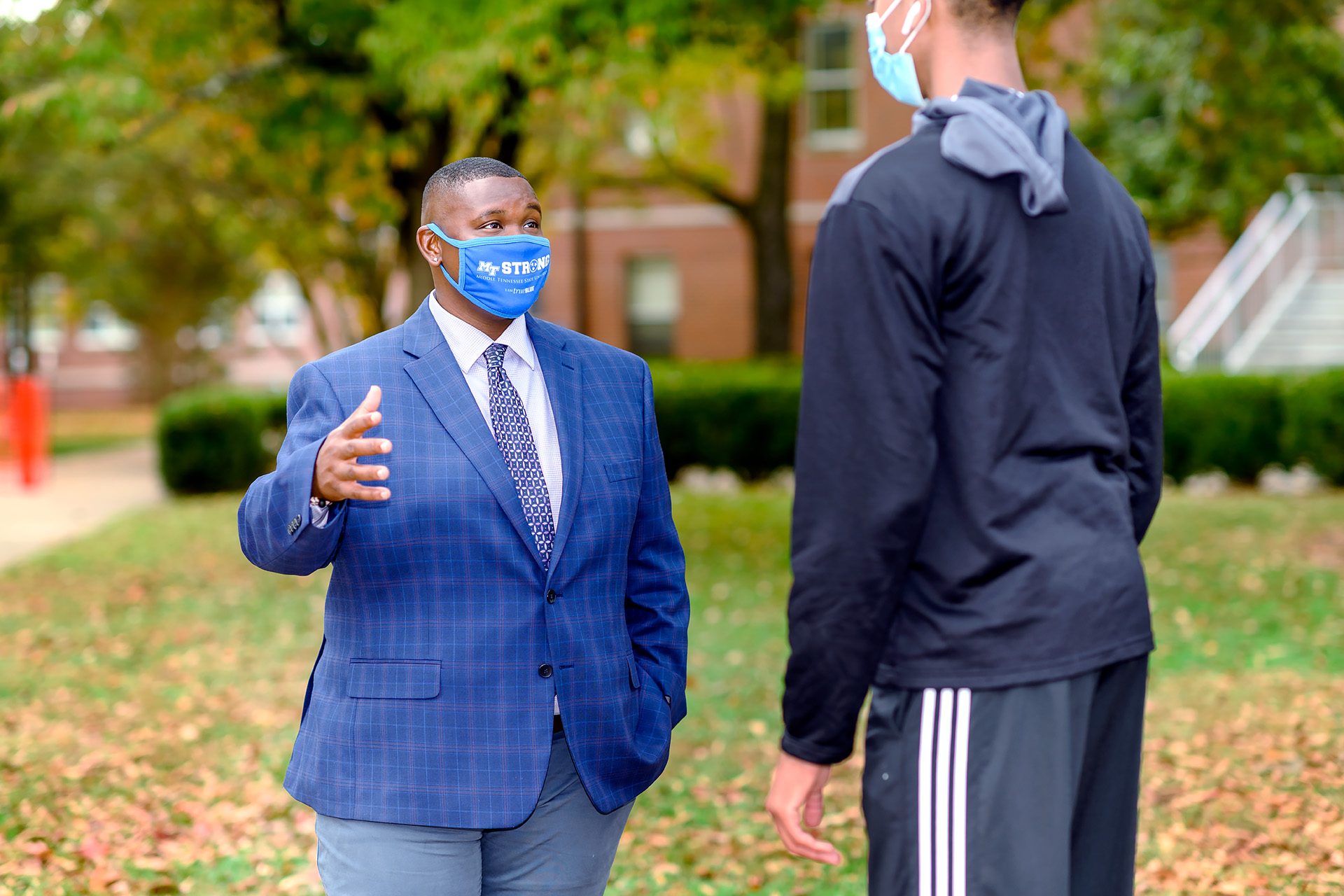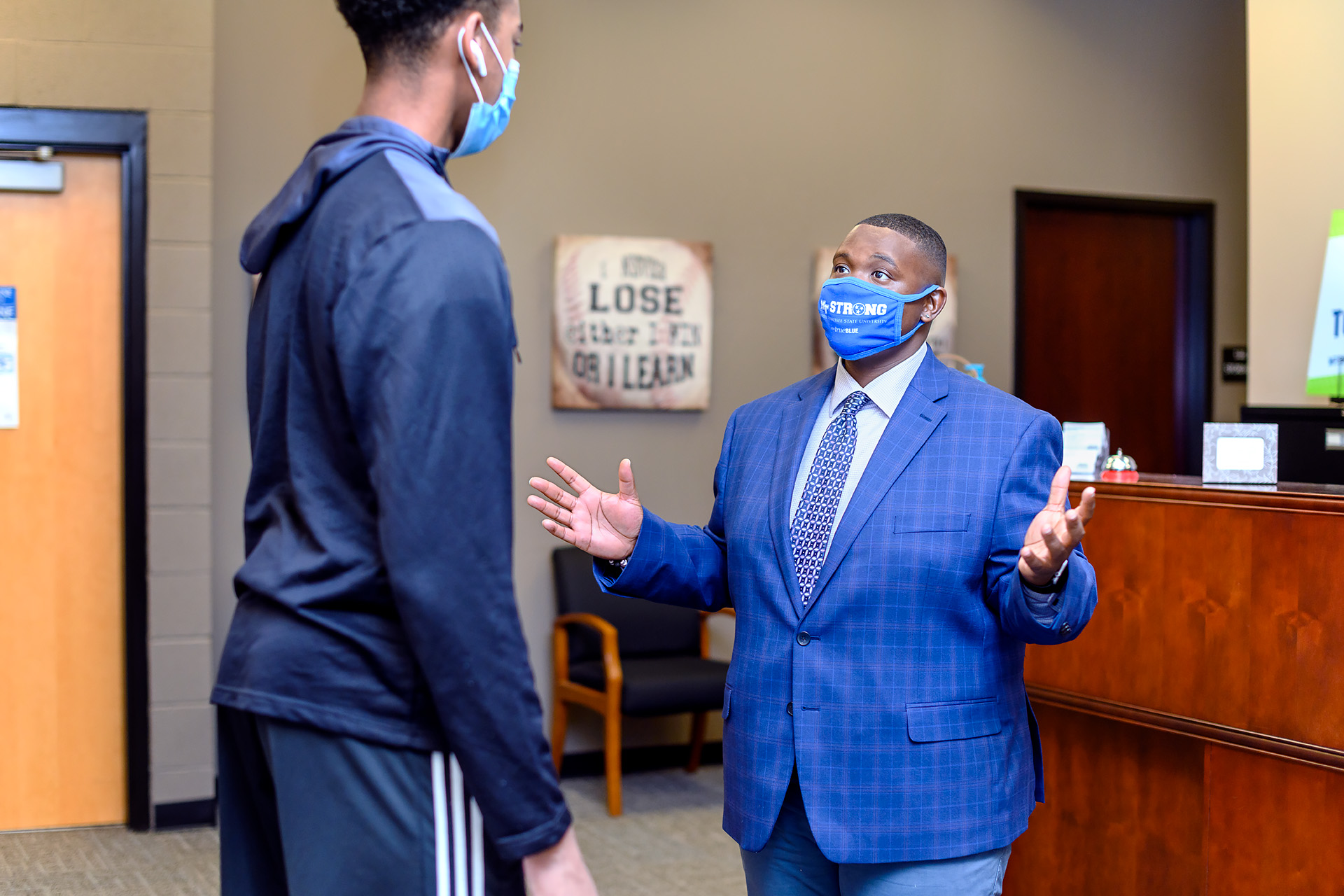Whether they’re clarifying details of an assignment with their professors or just trying to make new friends, communication is an essential skill for first-time freshmen on a college campus—and it’s even more important for students participating in the MTSU Scholars Academy.
Students in the MTSU Scholars Academy are usually first-generation college attendees and/or Pell-eligible students.
As the Assistant Manager of the Scholars Academy program within the Office of Student Success, Travis Strattion is responsible for ensuring those students are provided with a quality education and a supportive learning environment. Part of that role also includes equipping students with the tools they’ll need for success at MTSU and beyond.
“I am helping them with their challenges,” Strattion said. “I do my best to make sure they understand test-taking strategies, note-taking skills, time management…really anything that will set them up to ensure they will have a successful semester and help them create relationships that are sustainable throughout their four or five years here.”

Travis Strattion, Student Success Assistant Manager of Scholars Academy with student Kalen Hodges. (Photo: J. Intintoli)
When the COVID-19 pandemic began in the spring, many of Strattion’s students were in their second semester and would soon encounter their first taste of college classes outside of the typical classroom setting.
“For a lot of them, there was a big learning curve and a huge challenge,” he said. “We saw a lot of them struggling to keep up with the workload, but we did our best to provide them with support from different resources.”
Strattion said he and his colleagues first had to figure out “who was doing what” on campus to ensure a smooth transition from in-person classes to remote learning. They took advantage of the extended spring break period to develop materials and unpack some of the experiences the students were having.
“We wanted to make sure we were understanding how the students were feeling,” Strattion said. “They needed to unpack everything that was going on because quickly the economy was impacted and their families could’ve been impacted by that. We wanted to make sure we were doing everything we could to support them.”

Travis Strattion, Student Success Assistant Manager of Scholars Academy with student Kalen Hodges. (Photo: J. Intintoili)
Strattion and his team held weekly meetings with students just to check-in and see how things were going. He said he also used those meetings to connect students to the people and resources they needed most.
“I believe institutions are mirrors of the larger society,” he said. “You have to be transparent, and you cannot ignore the external factors. Having that awareness of what exactly is going on allows us to [help] our students be successful.”
Strattion believes his commitment to transparency and honesty resonates with students, and it helps them see staff and faculty as people first. Because his team is committed to developing a rapport with students and showing they care about more than just grades and course schedules, students feel more comfortable trusting him and his team to help them handle any challenges that come their way.
In the summer, Strattion and his team had to transition and hold their freshman summer institute virtually for the first time ever. The team utilized Zoom and tried to create a real “sense of belonging” by meeting with students regularly and getting to know them.
“We wanted to be open and available to these students whether it was through text, a phone call, FaceTime, whatever,” he said. “We wanted to be creative and go overboard with communication.”
Because he started forging relationships and open communication with his students over the summer, he was able to intervene early in any challenges those students faced in the fall. With fewer students on campus, Strattion says that communication with students has changed how his days normally flow.
“Because of the decreased density on campus, both with housing and classes, it is a different feel,” he said. “Some students are struggling with it and it’s important we be there for them. That can sometimes extend past that 8 a.m. to 4:30 p.m. timeframe, but it’s super important to understand who needs what and how I can communicate that to them.”
“The quicker we know what’s going on the faster we can help them.”
Strattion says he has also been so impressed with the way students have risen to meet their challenges. Students in the freshman summer institute were talking and getting to know one another via text and Facebook groups long before their classes even started. Strattion and his team used Google Classroom to foster that “sense of belonging” and encourage students to connect with each other.
“I was blown away by that,” he said. “Still today those relationships are there. I am seeing these students supporting each other and them checking in on one another making sure they’re all okay.”
Strattion says it takes a village and it’s fulfilling to see students not only be peers but supporting one another through these times.
— Hunter Patterson (Hunter.Patterson@mtsu.edu)


COMMENTS ARE OFF THIS POST